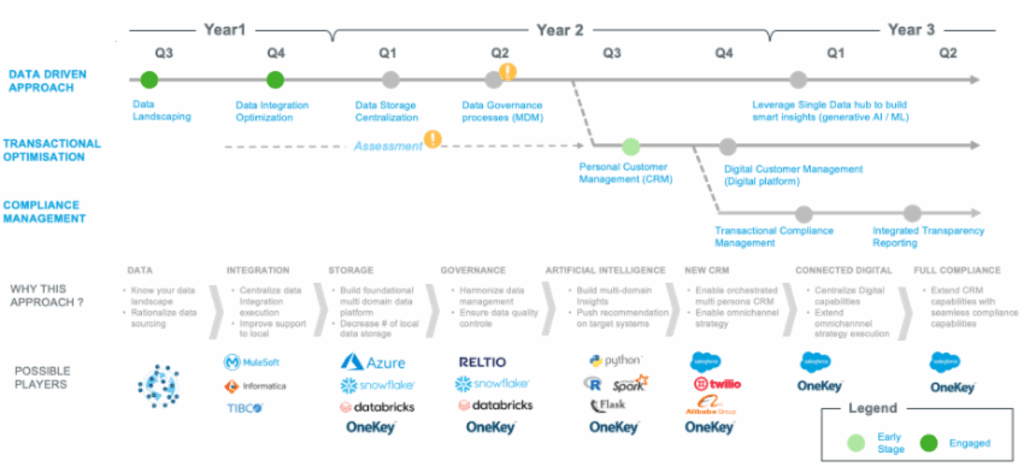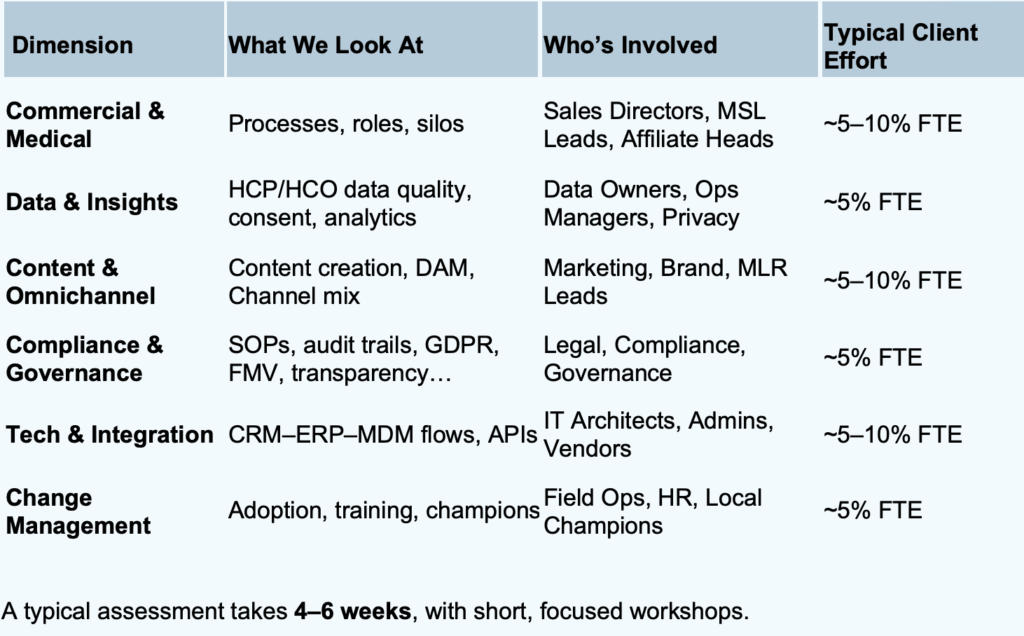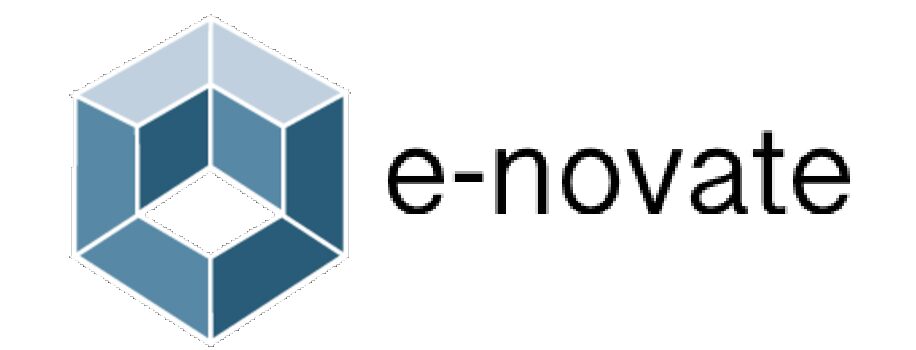During my seven years at IQVIA, I had the opportunity to be part of the launch of the Orchestrated Customer Engagement (OCE) offering, which represented a significant advancement for the pharmaceutical industry. This solution aimed to provide a comprehensive ecosystem, combining technology (CRM, marketing, business intelligence…), data, and services, all designed to transform customer engagement and optimize the commercial processes of pharmaceutical companies. We achieved great success with this offering, but the time has come to turn a new page.
A few months back, IQVIA made the decision to transfer its technology and development resources to Salesforce, forcing its clients to reassess and redefine their technology stack. Considering this transition, the choices ahead are crucial. On one hand, Veeva has chosen to re-platform on AWS, while on the other, Salesforce has taken over IQVIA’s promise by focusing solely on technology, thereby disrupting the complete ecosystem that supported customer engagement.
Now, having moved on from IQVIA, I co-founded E-NOVATE with the aim of guiding pharmaceutical companies in making strategic decisions to choose the best technological option. This is essential to avoid common pitfalls and ensure long-term success. The landscape has changed, and there is much to consider before making decisions that will deeply impact future operations and the performance of pharmaceutical businesses.
Let’s be honest: Everyone in Life Sciences talks about digital transformation.
Everyone wants to be “customer-centric.”
And everyone hopes their next CRM migration will magically fix their sales, medical, marketing and maybe even compliance headaches too.
But here’s the catch:
- New technology alone won’t solve broken processes, scattered data, or siloed teams.
- A fancy platform won’t work if your people aren’t ready.
- And shiny features mean nothing if you don’t know how your real operating model works today.
So, before you pick your next CRM, Salesforce, Veeva, or whatever, pause for a second:
- Are you clear on how mature your processes really are?
- Are your data and governance ready to scale?
- Will your teams know how to work differently tomorrow?
This paper is your reality check.
In the next pages, we’ll unpack:
- What’s changing in the CRM world (hint: the Veeva–Salesforce rivalry is just getting started)
- Why your operating model should come before any big IT decision
- What a good assessment really looks like (no fluff, real people, real pain points, real value)
We will also introduce how E-NOVATE can help future-proof your roadmap before you sign anything you might regret
Grab your coffee and let’s make your next CRM move a really smart one.
What’s changing in the CRM World?
Speed Is Good. Smart Speed Is Better.
The Life Sciences industry is changing fast.
- Veeva is moving its CRM away from Salesforce and rebuilding on AWS.
- Salesforce is strengthening its Health & Life Sciences Cloud to compete head-on.
For pharma, Biotech, and Medtech companies, this creates new choices and hidden risks:
- Migration headaches
- Compliance pitfalls
- Poor user adoption
- Costly vendor lock-in
A successful CRM transformation is not just a tech decision, it must be rooted in your real operating model: people, processes, data, and governance.
Where Companies Get Stuck
- Buying a shiny new CRM without fixing old habits – Example: Field teams keep doing spreadsheets on the side because the system doesn’t match how they actually work.
- Underestimating messy data and integration headaches – Example: Duplicate HCP records and missing opt-ins block omnichannel engagement.
- Missing compliance gaps that turn into real risk – Example: Local affiliates handle consent differently until an audit reveals the gaps.
- Rolling out features that nobody uses – Example: You invest in advanced AI suggestions, but reps ignore them because the basics don’t work.
Why Your Operating Model Should Come Before Any Big IT Decision
Changing or upgrading your CRM is not just a technical project, it impacts how your entire organization works every day. Too many companies choose their next CRM or vendor based on features alone, without first checking if their current ways of working, governance, and data are mature enough to make the most of it.
Your operating model defines how your people collaborate, how information flows, how compliance is managed, and how decisions are made. If you skip this step, you risk investing in tools that don’t fit your reality, leading to poor adoption, manual workarounds, and wasted budget.
By assessing your operating model first, you get a clear picture of what’s working, what’s missing, and what needs to change.
This means you can choose a solution that truly fits your business and design a roadmap that your teams can actually deliver.
It means that you ideally need to follow these steps to build confidence:
✔️ Assess current commercial & medical model
✔️ Identify maturity gaps and risks
✔️ Align stakeholders around realistic priorities
✔️ Design a roadmap that fits your business, your readiness for disruption, not just a vendor’s pitch

Example of an IT strategy
What a good assessment looks like?
It’s not just a slide deck…
So, what does a real, effective operating model assessment look like in practice?
It’s not just a slide deck or a quick vendor checklist: it’s a structured, practical deep-dive into how your business really works today.
A good assessment combines workshops, focused interviews, and evidence-based analysis to uncover your true strengths and weaknesses: across people, processes, data, governance, and technology.
The goal is simple: to give you a clear, realistic picture of your maturity level, your biggest risks, and the quick wins that will make your CRM transformation succeed.
It is good to think “visionary”, but it’s equally critical to make sure your organization has the right foundations:
- Before asking detailed reporting, how mature is your organization with master data management (managing HCP’s names, speciality, addresses…)?
- Before running a marketing campaign, how good is your organization with consent management (opt-in/out, topic management…)?
- Before jumping into the promises of AI, how good is your organization’s data quality and data governance?
The result?
You avoid surprises, make better vendor decisions, and build a roadmap that your teams can actually deliver instead of one that looks good on paper but fails in the real world.

Typical deliverables that will help you make the right move
✅ A clear heatmap of your strengths & gaps: A visual maturity assessment of your operating model to highlight strengths, vulnerabilities, and areas needing improvement.
✅ Practical recommendations for possible scenarios: Concrete, tailored recommendations for your situation, helping you choose the most suitable option (e.g., system migration).
✅ A realistic, phased roadmap for transformation: A detailed transformation plan with clear steps to follow, ensuring your teams can progress gradually and avoid surprises.
✅ The confidence to negotiate with vendors on your terms: Solid insights to enter vendor negotiations with a clear view of your needs, helping you avoid costly mistakes.
✅ A view on possible ROI: An estimate of the return on investment for each scenario, helping you prioritize
Why E-NOVATE?
E-NOVATE (www.e-novate.ch) is an independent consulting firm specialized in the Health & Life Sciences (HLS) industry.
Our mission: to help Pharma, Biotech, and Medtech companies navigate complex CRM and digital transformations with confidence, by aligning technology with real-world people, processes, and governance.
Our founders are true industry insiders:
- Over 10 years at one of the world’s largest HLS data providers, shaping global customer engagement strategies.
- HLS product evangelists and solution engineers, including the creation of a solution later acquired by Salesforce to build its Life Sciences Cloud.
- Trusted advisors on numerous CRM and commercial model transformations for top 10 pharma groups and innovative regional biotechs alike.
- Recognized experts in commercial operating model design, GTM strategy, process harmonization, and innovation roadmaps.
When it comes to CRM transformations in Life Sciences, you don’t need an army of junior consultants learning on your time … You need real industry experts who’ve seen it, done it, and know how to make it work in the real world.
Why pay double for a big firm’s logo, only to get a team of fresh graduates with no real-life HLS experience?
With E-NOVATE, you get direct access to trusted senior advisors, at a fair price, with no overhead for bureaucracy you don’t need.
Independent, vendor-neutral, and 100% focused on Life Sciences, that’s why companies choose E-NOVATE when they want to make the right choices before they invest millions.
Contact us at: https://e-novate.ch/contact/

